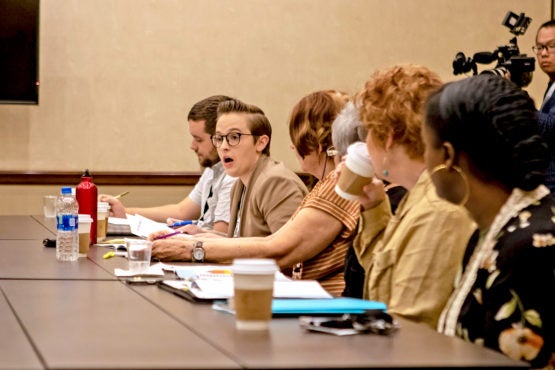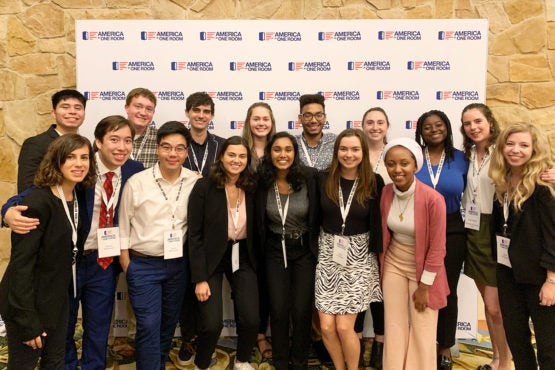Sophomore Yasmeena Khan says that growing up in San Francisco she was never really exposed to people with fiscally or socially conservative ideas. But recent learning experiences through Stanford have introduced the symbolic systems major to many more viewpoints, opening up new perspectives about how American democracy can work.

Stanford students helped moderate small voter groups that featured people of varying viewpoints reflecting on issues they consider most important to the country. (Image credit: Jason Liu)
In late September, Khan, along with 13 other classmates as part of a three-week Sophomore College course, traveled to Dallas, Texas, to help with the “America in One Room” event. Organized by Stanford professors Larry Diamond and James Fishkin, along with Alice Siu of the Center for Deliberative Democracy, this landmark experiment brought together more than 500 registered voters who represent the political, cultural and demographic diversity of America.
But the event, which required months of planning to organize, almost didn’t happen. The day before the event was scheduled to begin, organizers were unexpectedly faced with a moderator shortage. Stanford students were asked to step in and lead group deliberations with the voters about five issues in the 2020 presidential election: the economy, immigration, health care, the environment and foreign policy.
“The thing that was probably the most terrifying was that we were so young in comparison to most of the participants, and so a lot of us were worried about whether or not they would respect our authority,” Khan said.
Diamond said the students made a huge difference to the overall outcome of the experiment. “It was challenging for them, but they won over the participants. The whole, thing, frankly, just turned out crazy wonderful,” said Diamond, who is a senior fellow at the Freeman Spogli Institute for International Studies and at the Hoover Institution.
“The Stanford students made an amazing contribution. It was an all-hands-on-deck kind of situation,” said Fishkin, the Janet M. Peck Professor of International Communication in Stanford’s School of Humanities and Sciences.
Deliberative polling
The Stanford Center for Deliberative Democracy’s “Deliberative Polling” method brings together a representative sample of people to discuss issues with balanced briefing materials and trained moderators and has been conducted over 100 times in more than two dozen countries. September’s Texas experiment was among the largest of the center’s projects.

As part of a Sophomore College course, 14 students traveled to Dallas, Texas, to help staff the “America in One Room” event. (Image credit: Nelia Peralta/Center for Deliberative Democracy)
Armed with classroom knowledge of the Deliberative Polling method they had learned back at Stanford, the students put it into practice in Dallas, maintaining their own strict political neutrality as moderators and guiding small voter groups full of varying viewpoints through productive conversations.
“It was a pretty incredible experience, and we felt like we were actually doing something to bolster democracy, rather than just being democracy’s bystanders,” Khan said.
Sophomore Tenzin Kartsang’s experience as a moderator got off to a rocky start. Kartsang, who is a first-generation Asian American, was assigned a group that was suspicious of his unwillingness to share his own political viewpoints (in keeping with his moderator training). Some members ignored his instructions or made inappropriate remarks during the discussions, with one elderly white participant even going so far as to ask if he was a Russian spy.
Diamond praised Kartsang’s ability to remain professional and impartial throughout. When Kartsang finally shared his life story at the end of the experiment, including details about how his grandparents escaped Communist Chinese rule in Tibet and his parents were born in refugee settlements in India, his group applauded.
A major takeaway of the experiment is that the divide between Americans with different and entrenched viewpoints is not unbridgeable. The deliberations ended up changing many participants’ opinions, which moved more to the middle of the political spectrum.
Republican challengers to President Trump – William Weld, Joe Walsh and Mark Sanford – appeared on video to answer people’s questions. Two Democratic candidates, Michael Bennet and Julián Castro, BA ’96, also participated. The programming additionally incorporated conversations with top policy experts.
“We’re not as polarized as maybe some in the media or political pundits will make it seem like it is,” said Kartsang, who is interested in pursuing a major in political science.
Khan says this experience has given her more hope for American democracy. She plans to attend upcoming conservative events on campus to familiarize herself with points of views that might differ from her own.
“The more we recognize that you don’t have to be enemies with somebody who votes differently than you, the more I think we’re going to be able hopefully to start to make democracy a little bit less polarized, a little less angry, a little less contentious,” Khan said.
Along with the Center for Deliberative Democracy, the Dallas event was organized by Helena, a nonpartisan organization, and By the People Productions. The random sample of voters was recruited by NORC at the University of Chicago.
Diamond is also a professor, by courtesy, of sociology and of political science in Stanford’s School of Humanities and Sciences.
Fishkin is a professor, by courtesy, of political science and the director of the Center for Deliberative Democracy. Siu is the Center’s associate director.
